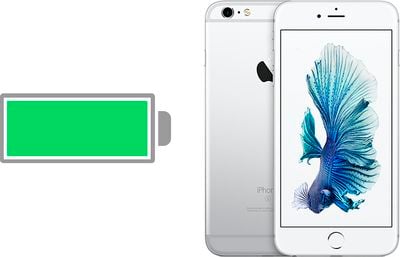Apple Did Not Consider How Battery Replacement Program Would Impact iPhone Upgrade Rates
During today's earnings call covering the first quarter of 2018, Apple CEO Tim Cook was asked whether investors should be concerned about slowing upgrade rates due to Apple's battery replacement program and the fact that consumers may opt to replace their batteries instead of purchasing a new iPhone.

In response, Cook said that he couldn't answer because it wasn't something that Apple took into account. Apple "did not consider, in any way, shape, or form, what it would do to upgrade rates," said Cook.
We did it because we thought it was the right thing to do for our customers. I don't know what effect it will have for our investors. It was not in our thought process of deciding to do what we've done.
In the same answer, Cook said the iPhone has fantastic reliability, and that the previously-owned market is continually expanding, with customers handing down older iPhones and using trade-ins to get new devices. Cook said he believes customers handing their devices down is a positive, because "the more people on iPhone, the better."
Following the revelation that Apple introduced power management features that slow older iPhones in order to prevent unexpected shutdowns in devices with degraded batteries, Apple was accused of planned obsolescence and deliberately slowing devices to prompt customers to upgrade.
Apple has vehemently denied that the power management features were implemented to spur customers to upgrade, and the company has said that instead, the features were meant to expand the life of an iPhone for as long as possible.
Apple has apologized for the misinformation that has circulated about the power management features, and it has also introduced a program allowing customers to get $29 battery replacements for the iPhone 6 and newer. In iOS 11.3, Apple will provide more information about battery health and give customers the option to toggle off the power management feature all together.
Popular Stories
Apple is preparing a "bold" new iPhone Pro model for the iPhone's 20th anniversary in 2027, according to Bloomberg's Mark Gurman. As part of what's being described as a "major shake-up," Apple is said to be developing a design that makes more extensive use of glass – and this could point directly to the display itself.
Here's the case for Apple releasing a truly all-screen iPhone with no...
While the iPhone 17 Pro and iPhone 17 Pro Max are not expected to launch until September, there are already plenty of rumors about the devices.
Below, we recap key changes rumored for the iPhone 17 Pro models as of April 2025:
Aluminum frame: iPhone 17 Pro models are rumored to have an aluminum frame, whereas the iPhone 15 Pro and iPhone 16 Pro models have a titanium frame, and the iPhone ...
The first iOS 19 beta is less than two months away, and there are already a handful of new features that are expected with the update.
Apple should release the first iOS 19 beta to developers immediately following the WWDC 2025 keynote, which is scheduled for Monday, June 9. Following beta testing, the update should be released to the general public in September.
Below, we recap the key...
If you have been experiencing issues with wireless CarPlay in your vehicle lately, it was likely due to a software bug that has now been fixed.
Apple released iOS 18.4.1 today, and the update's release notes say it "addresses a rare issue that prevents wireless CarPlay connection in certain vehicles."
If wireless CarPlay was acting up for you, updating your iPhone to iOS 18.4.1 should...
Apple's iPhone development roadmap runs several years into the future and the company is continually working with suppliers on several successive iPhone models simultaneously, which is why we often get rumored features months ahead of launch. The iPhone 17 series is no different, and we already have a good idea of what to expect from Apple's 2025 smartphone lineup.
If you skipped the iPhone...
Apple may have updated several iPads and Macs late last year and early this year, but there are still multiple new devices that we're looking forward to seeing in 2025. Most will come in September or October, but there could be a few surprises before then.
We've rounded up a list of everything that we're still waiting to see from Apple in 2025.
iPhone 17, 17 Air, and 17 Pro - We get...
Apple today released iOS 18.4.1 and iPadOS 18.4.1, minor updates to the iOS 18 and iPadOS 18 operating systems that came out last September. iOS 18.4.1 and iPadOS 18.4.1 come two weeks after the launch of iOS 18.4 and iPadOS 18.4.
The new software can be downloaded on eligible iPhones and iPads over-the-air by going to Settings > General > Software Update.
There have been complaints about ...
Apple today updated its vintage products list to add the 2018 Mac mini and the iPhone 6s, devices that will get more limited service and repairs now that they are considered vintage.
The iPhone 6s initially launched in 2015, but Apple kept it around as a low-cost device until 2018, which is why it is only now being added to the vintage list. The iPhone 6s had Apple's A9 chip, and it was...
Apple today released tvOS 18.4.1, a minor update to the tvOS 18 operating system that came out last September. tvOS 18.4.1 comes two weeks after Apple released tvOS 18.4, and it is available for the Apple TV 4K and Apple TV HD models.
tvOS 18.4.1 can be downloaded using the Settings app on the Apple TV. Open up Settings and go to System > Software Update to get the new software....
























